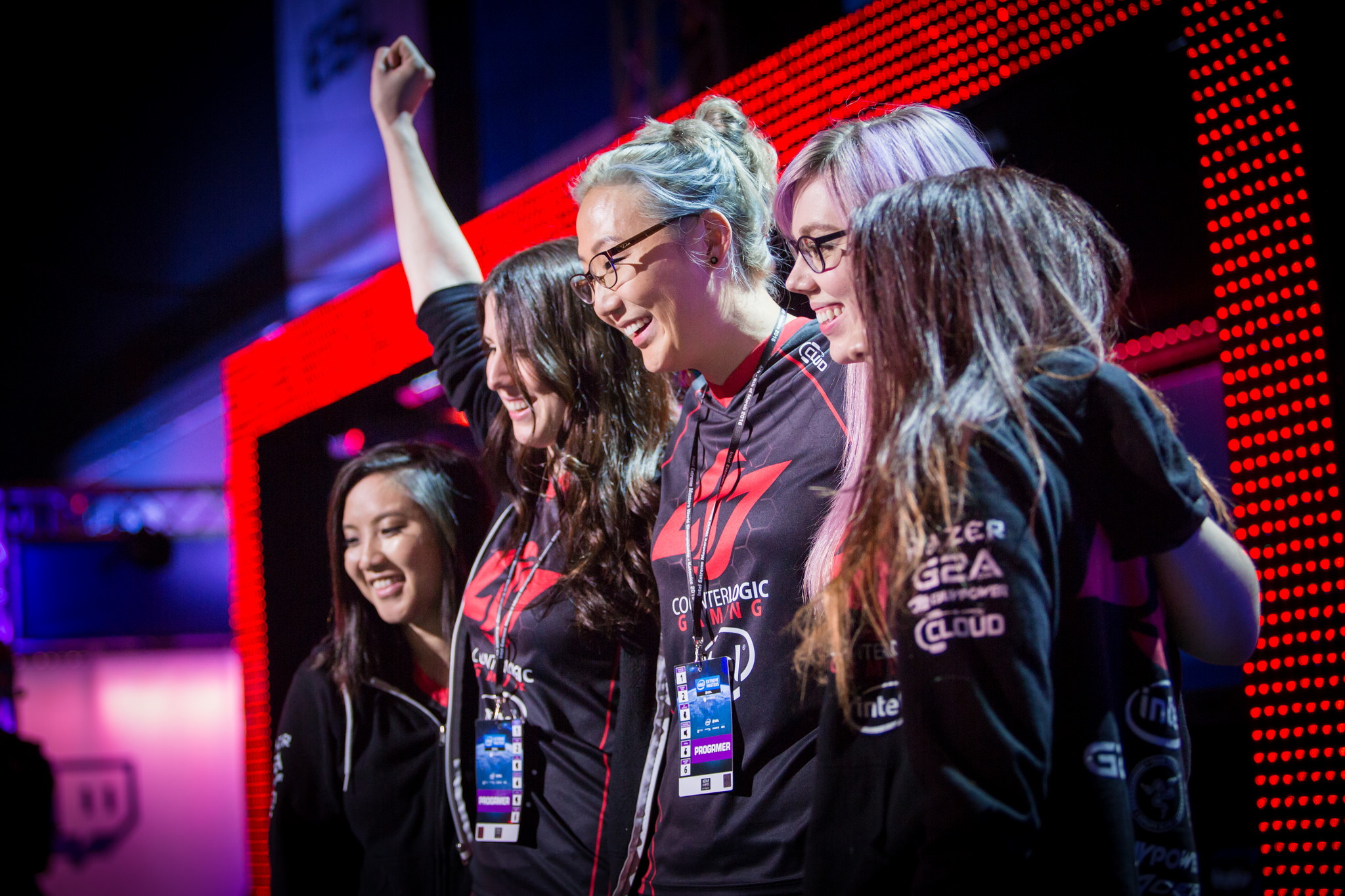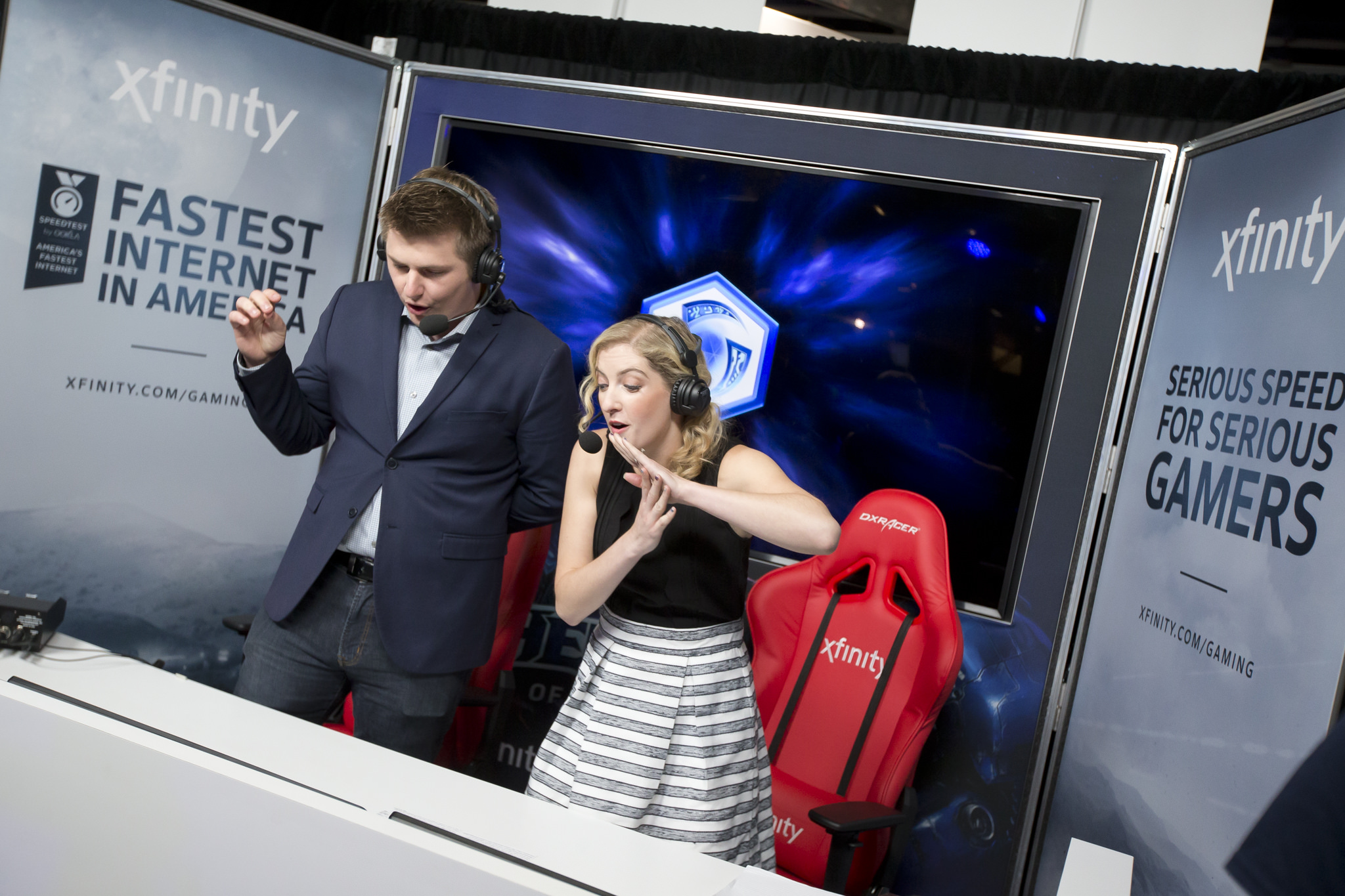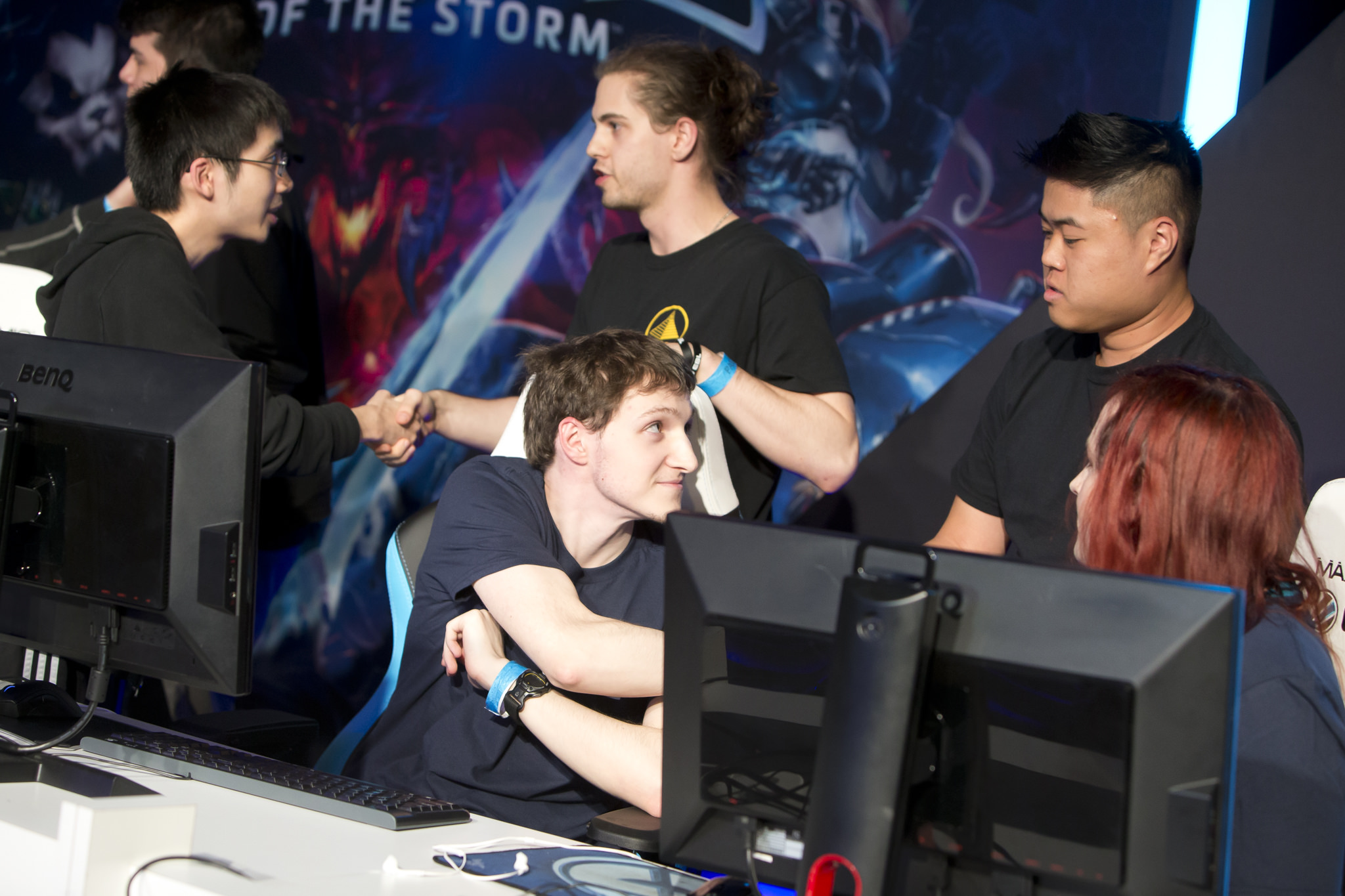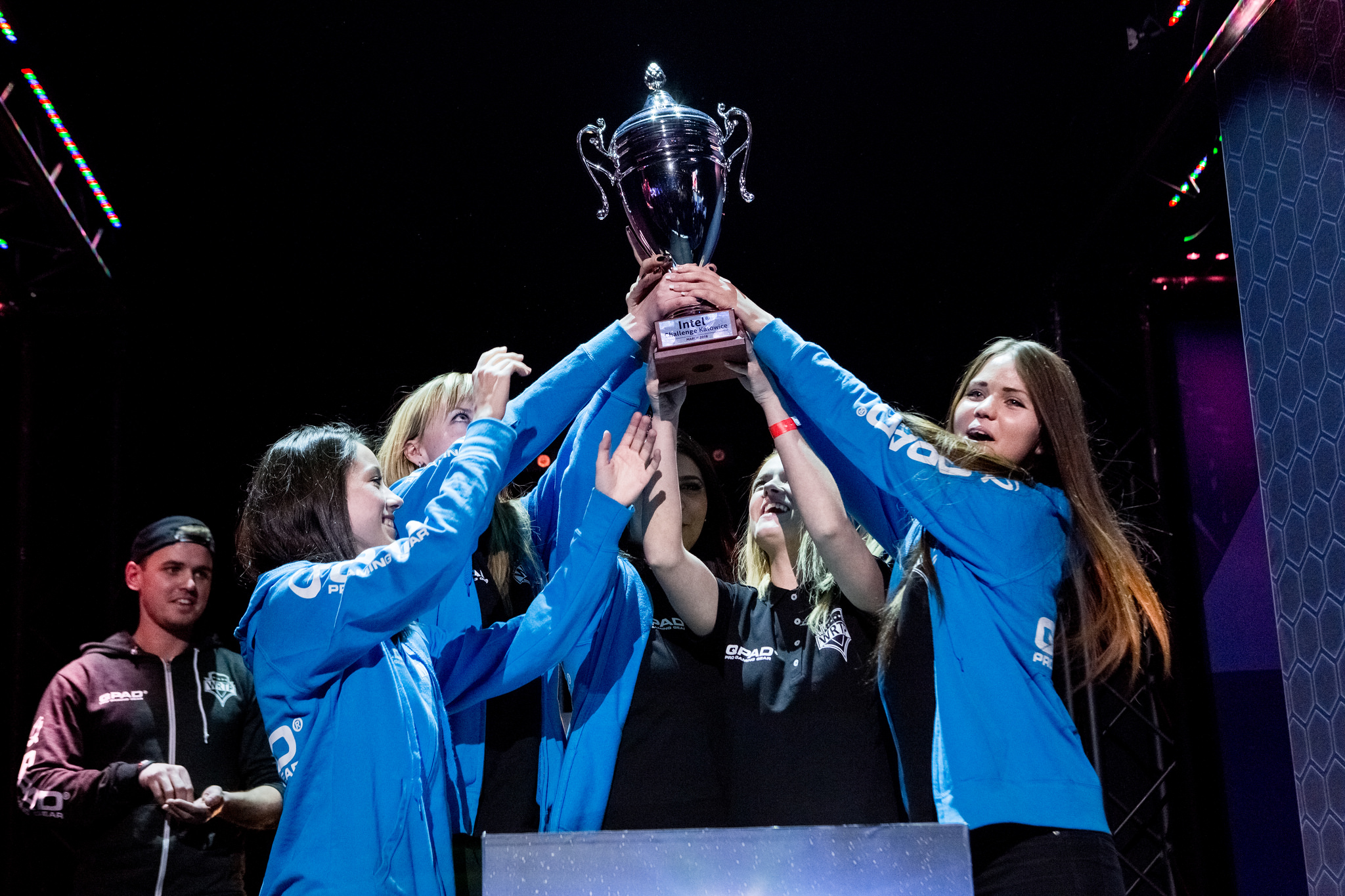AnyKey on a year spent advancing the cause of diversity in esports
"We'd like to get people more used to the idea of playing together and competing together in more diverse environments."

Over the course of Christmas and New Year, PC Gamer Pro will be exploring the moments that defined all of the biggest competitive games in 2016. Check back every day for another look back at this exciting, vibrant and growing aspect of PC gaming.
The esports diversity initiative AnyKey was launched back in February. It's an advocacy organisation, funded by Intel and ESL, whose aim is to provide resources and support for competitive gamers. Over the course of the last ten months they've produced four whitepapers covering topics from women in esports to online harassment.
Diversity has remained a contentious topic in the esports community throughout 2016, though structured discussion and formal research is relatively scarce. AnyKey stands out, in that regard: they've spent ten months curating a body of research that can be drawn on whenever the debate over inclusivity flares up across esports social media. A more nuanced, better-informed discussion about diversity is something that the organisation is well-placed to establish.
"We're a little bit of an unusual organisation on the industry side because we are research-oriented first" says AnyKey co-director Morgan Romine. "My co-director T.L. [Taylor, author of Raising The Stakes] is a professor at MIT, and I'm an anthropology PhD. Together we formulate a lot of our questions from the academic side. Then we bring in experts from various parts of esports, be they players or business people or researchers or peripheral manufacturers or whatever, and we organise workshops around those. From those workshops, we get our initiatives—theoretical strategies for how we might be able to address some of the problems that we're seeing."
The first workshop was about the challenges facing women in esports, while the second concerned online community moderation—often a related issue. "It ended up having a focus on Twitch chat in particular" Romine explains. "The obstacles that we face in this space become very visible when you're watching an esports stream where suddenly there's a woman on stage. The tenor of the chat certainly changes."

"That's a real challenge, because who is responsible for moderating that? You have lots of people involved. You have the tournament organisers, you have the game publishers, you have the platform. Is Twitch responsible for that? You have to decide who is responsible, and even then what tools do you even use to manage some of the gigantic fifty-thousand-person chat streams that you're often dealing with?"
In order to foster healthier online gaming communities, AnyKey established the 'Keystone Code'—a set of values that affiliate organisations are encouraged to support within their own communities. These values (compassion, integrity, respect and courage) are identified as factors common to all healthy communities—online or otherwise, gaming-related or otherwise.
"We worked with several different communities and community managers and companies to refine what were some of the core values that tended to inspire healthy community interactions" Romine says. "But we wanted it to be a little bit more than that. We wanted it be more like, if you're embodying these values then you're probably going to be a decent human being online and probably in life, also. Like respecting people—it's a pretty basic thing!"
Keep up to date with the most important stories and the best deals, as picked by the PC Gamer team.
To say that trash talk entirely is terrible and we should get rid of it denies part of what esports culture is. It's inherently competitive. But there are ways to trash-talk that are not putting down the person for who they are, right? There's a line there.
This is 'phase one', Romine explains. 'Phase two' is to tailor the Keystone Code for specific contexts: different games, communities, methods of communication, and so on. "Different communities have different personalities and things that make sense to them" Romine says. "Like esports, for example! Trash talk is a thing in esports, and we actually believe that it's a fundamental part of the culture. To say that trash talk entirely is terrible and we should get rid of it denies part of what esports culture is. It's inherently competitive. But there are ways to trash-talk that are not putting down the person for who they are, right? There's a line there."
Attitudes to community moderation vary within the industry, as do attitudes to diversity generally. "There are some [companies] that are completely averse to trying to manage their communities at all" Romine says "and think that the ungoverned 'the Wild West will manage itself' strategy works best. There are other companies who take the need to cultivate positive communities seriously."
"Companies are starting to realise" Romine continues. "'Oh wow, we have a whole audience of potential players who are not engaging with our product because there's this negative community around it.' There are some companies who still deny that this is a problem and some that are actively working towards making things better. And since this is our first year of reaching out to companies and working with people, we've been pleasantly surprised."

Romine highlights Twitch as one major player that is actively engaged in trying to improve its moderation tools. "They have a thriving platform that's growing constantly" Romine says. "There are a lot of moving parts and things have been moving slowly with them, but they're very keen on making sure that their spaces can be positive, giving people the tools to manage their communities how they'd like. Twitch has been really great."
AnyKey's most recent workshop focused on collegiate esports in the US. "It's a really interesting topic because we've actually found that the collegiate esports space tends to be a little bit more diverse than the upper echelon professional esports scene" Romine says. "We're exploring that area as a space with a lot of potential to learn good lessons, to see what they're doing and maybe expand on that."
Creating new opportunities and alternative competitive structures is one of AnyKey's main areas of focus at present. Most recently, the AnyKey Invitational at IEM Oakland was a showmatch between CLG Red and Team Secret, two of the most prominent women's CS:GO teams. The winner donated $10,000 to Online SOS, a support group for people who deal with harassment online.
"Ideally we'd like to see some there for all women, but we'd also like to see more gender-inclusive competitive opportunities" Romine says. "In the future we're hoping to see more co-ed opportunities, you know? They don't have to be the main esports event, we're not trying to force the high-level teams to 'meet a diversity quota' or anything, we don't think that quotas are a great idea. But we'd like to get people more used to the idea of playing together and competing together in more diverse environments."
Normalising diverse competition is a theme that links event planning, broadcasting, and community management. AnyKey's All Star video series showcases the diversity of players, industry figures and support personnel in esports. "There are a lot of women who work behind the scenes in the esports space" Romine says, "a lot of people of colour who we don't normally see who are actively involved. Esports tends to focus a lot of their limelight on the elite players, which is great except that you tend to see the same faces over and over and over again. We're hoping to be able to provide a little bit more visibility for those people are in the space that maybe you don't get to see all of the time, who can then be inspiration and rolemodels for other women, people of colour, LGBTQ, and gamers who have disabilities—who maybe have assumed that they don't fit in because they don't see people like them who are playing competitively or involved in esports."
"We have the theory that you have to see it to be it" Romine continues. "A lot of the women that we've talked to say that there was a moment when they saw another woman or a team of girls competing at an event, and that was the thing that made them realise 'oh, I can do that! I can totally do that!'"
Setting new examples is, similarly, a vital part of AnyKey's community management strategy. "There are a couple of different strategies and I think the best one, or the one that we encourage the most, is to create alternative spaces for differing voices" Romine says. "Instead of trying to scrub out and replace what is already there—which even if it's super, super toxic, can be very difficult... it just tends to be more overall inclusive to just provide an alternate space."
I've found that as long as people are willing to talk to us and they're not defensive already, then usually can have a productive conversation.
These alternate spaces then have the potential to inspire positive change in the community as a whole, Romine suggests. "Let's provide alternative spaces where people can meet each other and play games together and build a community that they have fun with. Then, we're hoping that that will then help to build a presence in larger spaces like the large Reddit boards that are otherwise taken over by trolls, haters and whatever."
The more people are encouraged to form positive relationships with each other, Romine says, the more amenable to diversity the community becomes. "We definitely do still come across people who are doubtful that women—women are just an example, any minority—deal with more harassment than anyone else" she says.
"There are deniers of that, although usually I've found that when we're actually able to engage in a conversation about it we can... I mean, I have one funny example of somebody who came up and was genuinely like 'why is this even a thing? Do women really not feel welcome?' He was honestly just perplexed, he wasn't being hostile or defensive, he was just perplexed."
"I asked him if he'd ever watched a Twitch stream that has suddenly had a woman on screen, and what happened in the chat. He thought about it for a second and then he was like 'ohhhhhh... yeah.'"

"I've found that as long as people are willing to talk to us and they're not defensive already, then usually can have a productive conversation. But again, we have also found that there so many people who come out of the woodwork saying 'thank god you guys exist, because this is a thing that we really need!' We've been overwhelmed by that kind of positive reception."
There are still challenges to be overcome. As in any other field, the nature of public discussion means that nuance is often lost. AnyKey's origins in research and academia do not necessarily gel with a social media environment that promotes brevity, certainty, and pithiness.
"There are always the 'hot button' issues like all-women tournaments" Romine says. "I'm very confident in our theory about all-women's tournaments, but it's nuanced. It's not just a yes or no answer, which is probably the reason that I think it's valid and makes sense. But not everybody online wants to hear a nuanced explanation. They want a tweet, and I don't think that particular topic is well addressed in a tweet-length answer. So we lose some of the audience at that point, unfortunately."
We love this space—and that's why we think it's important to address these problems.
Regardless, AnyKey's focus in its first year is on supporting the people most in need of the resources they provide. "Let's reach out to the people who want to know that this exists. 'Yes the environment sucks for you because you are not considered the stereotypical 'gamer' in whatever way, so let's help connect you with other people '" Romine says. "We're hoping to, at least in this first year, provide support to those people first."
AnyKey is currently applying for nonprofit status in the US, which Romine says will ensure that they remain exempt from the pressure that falls on commercial media outlets to provide popular answers in place of correct ones. "T.L. and I, being the academics that we are, are pretty stubbornly set on making sure that we're speaking truth, you know?" Romine says. "We're in defiance of that trend."
Beyond that, Romine hopes to begin the work of adapting AnyKey's message for the various communities that currently make up the esports scene. "We have some ideas about public-service-announcement-type ads or videos or whatever that are funny in some way that speak to the culture" she says. "Again, you have to speak to the context and be able to speak the language of the people who are there and put it as something meaningful for them."
"Being able to do it from within the gaming culture" Romine continues. "Being able to say 'hey look, we love games too! We think that they're awesome and we think that there's a lot of potential in esports too'. We love this space—and that's why we think it's important to address these problems."
Joining in 2011, Chris made his start with PC Gamer turning beautiful trees into magazines, first as a writer and later as deputy editor. Once PCG's reluctant MMO champion , his discovery of Dota 2 in 2012 led him to much darker, stranger places. In 2015, Chris became the editor of PC Gamer Pro, overseeing our online coverage of competitive gaming and esports. He left in 2017, and can be now found making games and recording the Crate & Crowbar podcast.


